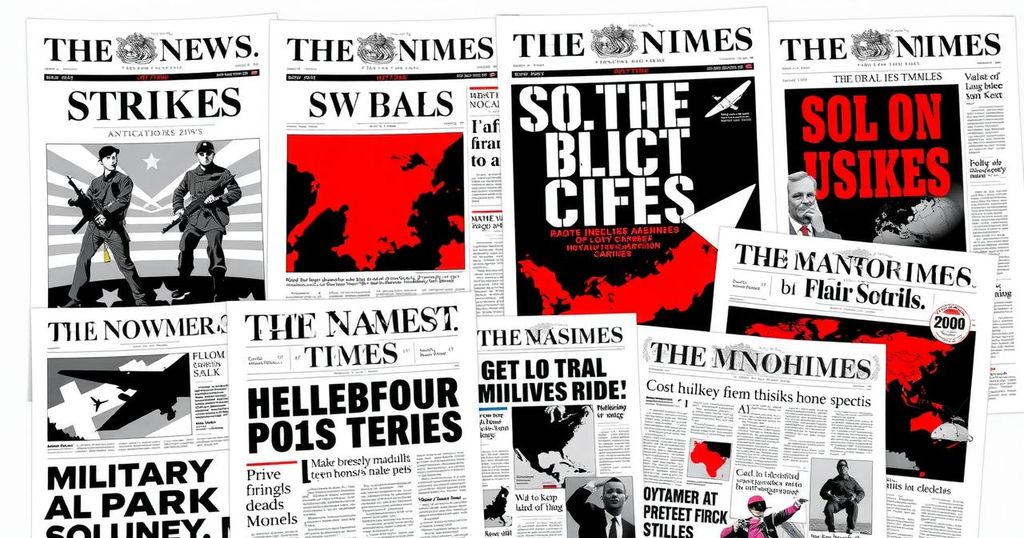U.S. Air Strikes on Iran Spark Global Tension and Calls for Diplomacy
U.S. air strikes on Iran’s nuclear sites prompt global reaction, with President Trump claiming victory while Iran vows revenge. Various media outlets discuss the risks of escalating conflict and the potential for a prolonged military engagement. Diplomacy calls emerge amidst fears of retaliation and rising tension in the Middle East.
Today’s headlines are dominated by the fallout from the U.S. air strikes targeting Iran’s nuclear facilities, a conflict escalation many are calling unprecedented. According to the Financial Times, President Trump is declaring victory following Operation Midnight Hammer, which saw the bombing of three sites. The U.S. administration insists that the conflict is with Iran’s nuclear program and not the nation itself, but critics are calling this a risky gamble.
The Metro captures the dramatic aftermath of the air strikes, stating the country is “hammered” and emphasizing the potential global repercussions. Satellite imagery has surfaced, revealing distinct craters at the Fordo nuclear site where “bunker buster bombs” were dropped. Iran has reacted vehemently, with its Foreign Minister warning of “everlasting consequences” for the strikes.
In a notable headline, The Sun declared “Stick it up your bunker,” evoking memories of the Falklands War and emphasizing the escalating tensions. World leaders are pressing for a de-escalation, but reports indicate the attacks have only heightened fears surrounding Iran’s potential retaliation.
The Guardian argues that this attack marks the most significant military intervention in recent generations, suggesting that President Trump has aligned the U.S. with Israel against Iran. A warning has been issued, indicating that America could be drawn into a prolonged conflict that Trump had previously sought to avoid.
The Daily Telegraph remarks on Trump’s apparent shift from a candidate aiming to withdraw from military engagements to a wartime leader confronting Iran’s next steps. Secretary of State Marco Rubio cautioned that a retaliatory strike would be Iran’s biggest mistake.
Interestingly, while the war unfolds, the Times focuses on the implications of the Fordo strikes. Their headline states “Iran vows revenge on US,” detailing Tehran’s parliament’s vote to block the Strait of Hormuz, a critical route for global oil shipments. This action could choke the oil supply and has raised concerns worldwide.
The Daily Express highlights warnings from the UK’s Prime Minister about significant escalation regarding the conflict, asserting that this U.S. intervention has raised the terror threat level in Britain and among its allies. Similarly, the Daily Mail expresses fears about a possible “Iran terror backlash” impacting the UK, reflecting ongoing concerns about Iranian activity in the region.
The Daily Mirror’s headline, “Stop now,” reflects the Prime Minister’s call for calm and recognition of the risk posed by Trump’s actions. The i Paper reports on a Pentagon briefing that detailed the timeline of Operation Midnight Hammer and suggests urgent diplomatic measures may be necessary to stabilize the situation.
On a lighter note, the Daily Star devotes limited space to the air strikes, instead focusing their front page on a much-celebrated reunion of the band Oasis, dubbed likely by the band’s mother. With diplomacy seemingly in jeopardy, the stakes in this increasingly volatile situation remain high but appear to be overshadowed by other cultural news for some outlets.
As tensions flare, the U.S. air strikes have undoubtedly reshaped the geopolitical landscape, raising questions about future responses from Iran and the global community’s attempts to mediate a resolution amidst increasing instability.
In summary, the U.S. air strikes on Iranian nuclear facilities have led to a tide of narratives across various news outlets, with the implications garnering mixed reactions globally. The conflict appears to have intensified, leading many to call for immediate de-escalation, especially regarding potential retaliation from Iran. As world leaders navigate these turbulent waters, the question of how to maintain peace without further militarization looms large. Trump, now positioned as a wartime leader, faces a critical juncture as the situation continues to evolve.
Original Source: www.bbc.com




Post Comment